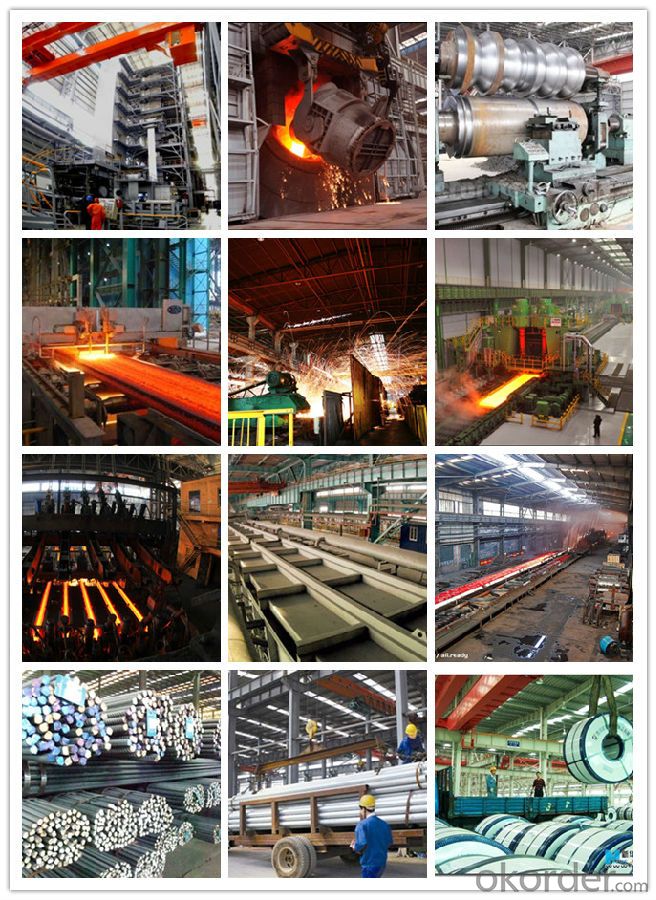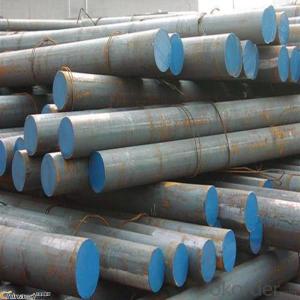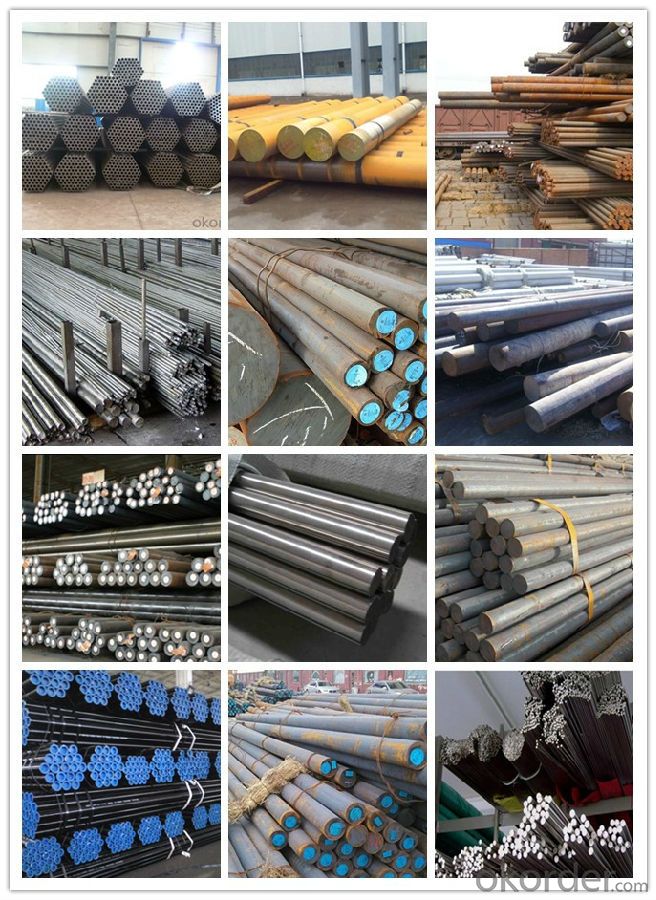Special Steel Hot-Rolled 15CrMo Steel Round Bar
- Loading Port:
- China main port
- Payment Terms:
- TT OR LC
- Min Order Qty:
- 30 m.t.
- Supply Capability:
- 10000 m.t./month
OKorder Service Pledge
OKorder Financial Service
You Might Also Like
Item specifice
Hot rolled 15CrMO steel round bar
other material available | Carbon and alloy: Cr-Mo alloy, Cr-Ni alloy, Cr-Mn alloy, Si-Mn alloy |
Dia.: | 10mm~1200mm |
Length: | Random or fixed as required |
Standard | GB,ASTM,JIS,BS |
Out Side Coating | Bare outside |
Ends | Plain ends with color painting |
Packing | Loose bundle |
Delivery | By container/train/lorry |
Third Party Inspection | SGS/BV/LORDS |
Delivery time | 7 days Min. |
Product show
Workshop show

Shipping
1. FedEx/DHL/UPS/TNT for samples, Door-to-Door;
2. By Air or by Sea for batch goods, for FCL; Airport/ Port receiving;
3. Customers specifying freight forwarders or negotiable shipping methods!
Delivery Time: 3-7 days for samples; 5-25 days for batch goods.
Payment Terms
1.Payment: T/T, L/C, Western Union, MoneyGram,PayPal; 30% deposits; 70% balance before delivery.
2.MOQ: 1pcs
3.Warranty : 3 years
4.Package Informations: 1) EXPORT, In 20 feet (GW 25 ton) or 40 feet Container (GW 25 ton)
2)as customer's requirement
Why choose us?
(1) The leading exporter in China special steel industry.
(2) Large stocks for various sizes, fast delivery date.
(3) Good business relationship with China famous factories.
(4) More than 7 years steel exporting experience.
(5) Good after-sales service guarantee.
- Q:What are the different cutting tools used for special steel?
- There are several different cutting tools that are commonly used for special steel applications. These tools are specifically designed to handle the unique properties and characteristics of special steel, which often requires more precise and specialized cutting techniques. Some of the most commonly used cutting tools for special steel include: 1. Carbide tipped saw blades: These saw blades have carbide teeth, which are extremely hard and durable. They can cut through special steel with ease, providing clean and accurate cuts. 2. High-speed steel (HSS) cutting tools: HSS cutting tools are made from a type of tool steel that can withstand high temperatures and maintain their hardness. These tools are commonly used for drilling, milling, and turning operations on special steel. 3. Diamond cutting tools: Diamond is one of the hardest materials known to man, making it ideal for cutting through tough materials like special steel. Diamond cutting tools, such as diamond-coated saw blades or grinding wheels, are commonly used in special steel applications. 4. Waterjet cutting machines: Waterjet cutting machines use a high-pressure stream of water mixed with abrasive particles to cut through special steel. This method is particularly suitable for complex shapes and intricate designs. 5. Plasma cutting machines: Plasma cutting machines use a high-velocity jet of ionized gas to cut through special steel. This method is often used for cutting thick sections of special steel quickly and efficiently. 6. Laser cutting machines: Laser cutting machines use a highly focused laser beam to cut through special steel. This method offers high precision and can be used to cut complex shapes and patterns. It is important to choose the appropriate cutting tool based on the specific requirements of the special steel being worked with, as well as the desired cutting method and application. Consulting with a specialist or referring to the manufacturer's recommendations can help ensure the best cutting tool is selected for the job.
- Q:What are the different joining methods used for special steel?
- The different joining methods used for special steel include welding, brazing, soldering, and mechanical fastening.
- Q:How does special steel contribute to the energy industry?
- Special steel contributes to the energy industry in various ways. It is widely used in the manufacturing of turbines, generators, and other critical components for power plants. Its high strength, durability, and corrosion resistance properties make it suitable for withstanding the extreme conditions found in power generation facilities. Additionally, special steel plays a crucial role in the production of pipelines and storage tanks for the oil and gas sector, ensuring the safe and efficient transportation and storage of energy resources. Overall, special steel enhances the reliability and efficiency of energy infrastructure, supporting the growth and sustainability of the energy industry.
- Q:How does special steel contribute to reducing product lead times?
- Special steel contributes to reducing product lead times by offering several advantages. Firstly, special steel is known for its high strength and durability, allowing manufacturers to produce parts that can withstand harsh conditions and heavy usage. This ensures that the products made with special steel have a longer lifespan, reducing the need for frequent repairs or replacements. Secondly, special steel can be fabricated into complex shapes and sizes, enabling manufacturers to produce intricate components with high precision. This eliminates the need for additional machining processes, saving time and reducing lead times. Lastly, special steel often has improved mechanical properties, such as higher hardness or heat resistance, which can enhance the performance of the final product. This allows manufacturers to meet specific requirements and deliver high-quality products more efficiently, ultimately reducing lead times.
- Q:What are the requirements for special steel used in agricultural machinery?
- The requirements for special steel used in agricultural machinery vary depending on the specific component or part being produced. However, there are some common requirements that are generally applicable to most agricultural machinery. 1. Strength and durability: Agricultural machinery operates under harsh conditions, such as heavy loads, friction, and exposure to elements. Therefore, special steel used in such machinery must have high strength and durability to withstand these conditions without deformation or failure. 2. Corrosion resistance: Agricultural machinery is often exposed to moisture, chemicals, and other corrosive substances. Special steel used in agricultural machinery should possess good corrosion resistance properties to prevent rusting and degradation over time. 3. Wear resistance: Agricultural machinery components, such as blades, gears, and bearings, undergo repetitive and abrasive actions during operation. Special steel should have excellent wear resistance to ensure prolonged service life and reduce maintenance costs. 4. Toughness: Agricultural machinery encounters sudden impacts, shock loads, and vibrations during operation. Special steel should exhibit high toughness to absorb and resist these forces without fracture or fatigue failure. 5. Machinability: Special steel should have good machinability to enable efficient and accurate machining processes during manufacturing. This includes properties like good formability, weldability, and ease of heat treatment. 6. Cost-effectiveness: While meeting the above requirements, special steel used in agricultural machinery should also be cost-effective. The material should strike a balance between performance and cost, ensuring that the machinery is affordable without compromising quality and performance. Overall, the selection of special steel for agricultural machinery should be based on a comprehensive understanding of the specific application requirements, considering factors such as load capacity, environmental conditions, and expected service life. Meeting these requirements ensures that the agricultural machinery operates efficiently, reliably, and with minimal downtime.
- Q:What are the properties of duplex stainless steel?
- Duplex stainless steel possesses a combination of excellent mechanical properties, including high strength and corrosion resistance. It offers good toughness and ductility, making it suitable for a wide range of applications. Moreover, duplex stainless steel exhibits a higher resistance to stress corrosion cracking and pitting corrosion compared to other types of stainless steel. Additionally, it has a good weldability, enabling it to be easily fabricated and used in various industries such as oil and gas, chemical processing, and marine environments.
- Q:How does special steel contribute to reducing energy consumption?
- Special steel contributes to reducing energy consumption in several ways. Firstly, special steel is known for its high strength and durability, which allows for the construction of lighter and more efficient structures. This means that less material is required, resulting in reduced energy consumption during the manufacturing and transportation processes. Additionally, special steel has excellent heat resistance properties, making it ideal for the production of energy-efficient appliances and machinery. By using special steel in these applications, energy losses due to heat transfer are minimized, resulting in lower energy consumption. Furthermore, special steel is often used in the production of renewable energy technologies such as wind turbines and solar panels. By utilizing these energy sources, which rely on steel components, the overall demand for fossil fuels and non-renewable energy is reduced, consequently decreasing energy consumption. Overall, the use of special steel in various industries plays a significant role in reducing energy consumption and promoting sustainability.
- Q:What are the properties and characteristics of special steel?
- Special steel encompasses a type of steel that possesses distinct attributes and qualities, rendering it suitable for particular applications that demand exceptional strength, endurance, and resilience against diverse environmental factors. The properties and characteristics of special steel encompass the following: 1. Remarkable Strength: Special steel is renowned for its extraordinary strength, enabling it to endure heavy loads and extreme circumstances. This renders it ideal for applications requiring structural integrity and durability, such as the construction, automotive, and aerospace sectors. 2. Superb Resistance to Corrosion: Special steel is frequently alloyed with elements such as chromium and nickel, augmenting its resistance to corrosion and oxidation. This characteristic makes it immensely valuable in environments where exposure to moisture, chemicals, or extreme temperatures can rapidly deteriorate conventional steel. 3. Resistance to High Temperatures: Special steel is designed to maintain its mechanical properties and structural integrity even when subjected to elevated temperatures. It demonstrates exceptional thermal stability, making it suitable for applications involving intense heat, such as power generation, the oil and gas industry, and manufacturing processes. 4. Resistance to Wear: Special steel is frequently hardened and treated to enhance its resistance to wear. This trait enables it to withstand abrasive materials, friction, and erosion, making it suitable for cutting tools, machine parts, and wear-resistant components in heavy machinery. 5. Magnetic Characteristics: Certain types of special steel exhibit magnetic properties, rendering them ideal for applications in the electrical and electronics industries. Examples include electrical transformers, motors, generators, and magnetic shielding. 6. Machinability: Special steel is designed to be easily machined, enabling it to be shaped, formed, and fabricated into various components with precision. This attribute is crucial for industries requiring the production of intricate and complex parts in an efficient manner. 7. Cost-effectiveness: Despite possessing unique properties, special steel often proves to be cost-effective compared to other materials with similar performance characteristics. Its long lifespan, resistance to corrosion and wear, and versatility make it the preferred choice for numerous applications, offering a balance between performance and cost. In summary, special steel combines exceptional strength, resistance to corrosion and wear, heat resistance, and magnetic properties, making it a versatile material utilized in diverse industries. Its distinctive properties render it an indispensable component in applications where standard steel or alternative materials would not suffice.
- Q:What are the different methods of improving the toughness of special steel?
- To enhance the toughness of special steel, various techniques can be utilized. One effective method involves the addition of alloying elements such as nickel, chromium, or manganese to the steel composition. These elements contribute to increased strength and resistance to cracking or fracturing. Another approach is to apply heat treatment processes like quenching and tempering. Quenching rapidly cools the steel from a high temperature, resulting in a hardened structure. On the other hand, tempering involves reheating the quenched steel to a specific temperature and then slowly cooling it. In addition, grain refinement techniques can be employed to improve toughness. Controlling the size and distribution of grains within the steel enhances its resistance to fracture. Methods like grain size control through recrystallization and severe plastic deformation can be used to refine the grain structure. Furthermore, maintaining low impurity content in the steel is crucial for its toughness. Impurities like sulfur and phosphorus can cause brittleness, so refining and purification processes should be employed to reduce their presence. Moreover, surface treatment methods such as shot peening or surface hardening can be implemented. Shot peening involves bombarding the steel surface with small spherical particles to induce compressive stress, which helps in resisting crack propagation. Surface hardening techniques like carburizing or nitriding create a hardened layer on the surface, enhancing toughness. In conclusion, improving the toughness of special steel can be achieved through alloying, heat treatment, grain refinement, impurity control, and surface treatment. These techniques can be used individually or in combination to enhance the steel's properties and make it more resistant to cracking or fracturing.
- Q:What are the different wear-resistant grades of special steel?
- In the market, one can find various grades of special steel that are resistant to wear. Each grade has its own unique properties and applications. Some commonly used grades include: 1. D2 Steel: This grade is known for its high resistance to wear and its exceptional toughness. It is often utilized in the manufacturing of cutting tools, punches, and dies. 2. M2 Steel: M2 steel is a type of high-speed steel that exhibits remarkable resistance to wear and heat. It is commonly employed in the production of drill bits, milling cutters, and other tools that require high hardness and wear resistance. 3. A2 Steel: A2 steel is a versatile grade known for its excellent resistance to wear and toughness. It is frequently utilized in the manufacturing of cold work tools, such as blanking dies and gauges. 4. O1 Steel: O1 steel is an oil-hardening tool steel that possesses good wear resistance and dimensional stability. It is commonly used in the production of blades, punches, and other cutting tools. 5. S7 Steel: S7 steel is a grade that is highly resistant to shock and wear. It is often employed in the manufacturing of chisels, shear blades, and other tools that require resistance to impact and wear. 6. AR400 Steel: AR400 steel is a specific type of abrasion-resistant steel that has a hardness of approximately 400 Brinell. It is frequently utilized in heavy-duty applications such as mining equipment, bulldozer blades, and dump truck bodies. These examples merely scratch the surface of the various wear-resistant grades of special steel available in the market. The choice of grade depends on the specific requirements of the application, including the type and intensity of wear, operating conditions, and desired hardness. Seeking advice from a steel supplier or expert can aid in selecting the most suitable grade for a particular application.
1. Manufacturer Overview |
|
|---|---|
| Location | |
| Year Established | |
| Annual Output Value | |
| Main Markets | |
| Company Certifications | |
2. Manufacturer Certificates |
|
|---|---|
| a) Certification Name | |
| Range | |
| Reference | |
| Validity Period | |
3. Manufacturer Capability |
|
|---|---|
| a)Trade Capacity | |
| Nearest Port | |
| Export Percentage | |
| No.of Employees in Trade Department | |
| Language Spoken: | |
| b)Factory Information | |
| Factory Size: | |
| No. of Production Lines | |
| Contract Manufacturing | |
| Product Price Range | |
Send your message to us
Special Steel Hot-Rolled 15CrMo Steel Round Bar
- Loading Port:
- China main port
- Payment Terms:
- TT OR LC
- Min Order Qty:
- 30 m.t.
- Supply Capability:
- 10000 m.t./month
OKorder Service Pledge
OKorder Financial Service
Similar products
New products
Hot products
Related keywords































